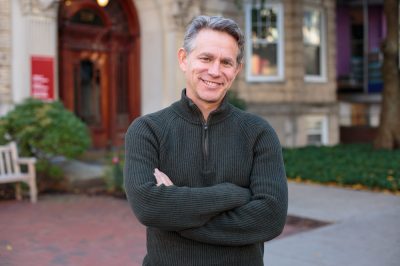The Brattle Theatre in Cambridge was abuzz Sunday night for the sold-out world premiere of “Inundation District,” a film directed by Boston University’s College of Communication professor David Abel, a contributing reporter for the Boston Globe and experience filmmaker with eight films to his name.
“Inundation District” was featured as the closing night film of the GlobeDocs Film Festival, a five-day documentary festival celebrating the Boston Globe’s film and production talent. This unique festival, exclusively dedicated to documentaries, is produced by the Boston Globe and is Boston’s only all-documentary film festival, said Lisa Viola, the festival’s director of programming.
Viola said documentary filmmaking is a “really vibrant, eclectic type of filmmaking.”
“The documentaries that we share at the festival mirror the idea where we’re exposing people to stories from all over the world, all over the globe, old and new,” Viola said.

Viola, who makes the final decisions on which films will be included in the festival, aims to showcase different styles and lengths of filmmaking.
“I am trying to find films that I think the Boston Globe readers, Boston Globe subscribers as well as the general public will appreciate learning more about,” Viola said.
The event includes screenings of the films and post-film conversations with journalists at select movie theaters like The Brattle Theater in Cambridge and the Coolidge Corner Theatre in Brookline.
Viola chose “Inundation District” as the night’s closing film because it’s “very timely” and “pressing,” she said.
“The fact that we’re facing these issues right here at home, we can’t escape it and I think it’s testament that David’s film sort of brings it to the forefront,” Viola said. “He shows us just how dire things are becoming, but also with some hopefully creative solutions as well.”
Viola expressed anticipation for the panel conversation following the film’s screening, which Boston Globe correspondent Loren King moderated in conversation with Abel and his collaborator on the documentary, Ted Blanco.
During his time at the Boston Globe, Abel and his fellow reporters were encouraged to add videos to their stories as newspapers adapted to online mediums. Abel admitted that he was initially skeptical of this addition, but his perspective quickly shifted as he collaborated with other reporters on their video-based stories.
Abel soon realized that video could be harnessed to create content that was “visceral and emotional and powerful and thoughtful.”
“I was just blown away that you could essentially tell a story through sound and sight,” he said.
Abel has created films on topics ranging from highlighting a runner in the Boston Marathon to the dynamics of Boston’s cod and lobster populations to addressing the critical issue of climate change around the city.
His most recent film, “Inundation District,” was inspired by the burgeoning “Innovation District,” or the Seaport District. Made up of four neighborhoods, the area is set to become the hub of new entrepreneurial activity and firms to spur economic growth.
“Inundation District” explores how rising tides and storm surges could be catastrophic for this collective of waterfront neighborhoods.
“As we started to build up this entirely new urban district, pouring billions of dollars of our state and local taxpayer money into building up all of this new infrastructure, I began to wonder, does this make sense?” Abel said. “How are we protecting this neighborhood? Who’s going to have to pay to protect it? And then what happens when the ultimate flooding eventually comes?”
Abel said this documentary aims to raise awareness of the threat of climate change.
“As a journalist, it’s always our job to cast light on the reality that we’re facing, on how our environment is changing, on how our neighborhoods are changing, on how our planet ultimately is changing,” Abel said.
Blanco expressed his drive to contribute to society through filmmaking.
“We’re telling this one story, but it’s happening all over the world,” Blanco said. “This is really the best way I can think of with the tools that I have to be a part of what is hopefully a solution towards solving the climate crisis.”



























































































































Frank kelliher • Nov 4, 2023 at 11:03 am
How can I see film on line ?? Thanks